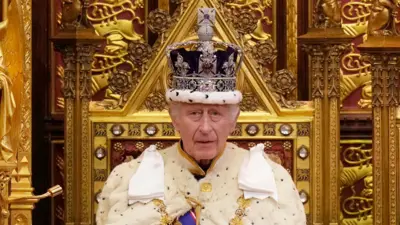We've updated our Privacy and Cookies Policy
We've made some important changes to our Privacy and Cookies Policy and we want you to know what this means for you and your data.
Coronavirus: UK child poverty and inequality could worsen says OECD
Image source, Getty Images
The Organisation for Economic Co-operation and Development (OECD) says the coronavirus pandemic risks worsening child poverty and inequality in the UK.
Its latest report on the country says it may also exacerbate weak productivity and regional disparities.
The think tank warns another major negative impact on trade and jobs could come from a no-deal Brexit.
The UK faced "prolonged" disruption and was at a critical juncture, it said.
The think tank did, however, revise its estimate for the UK economy, the world's sixth largest, and now expects it to contract by 10.1% rather than the 11.5% it forecast in June. It is also expected to shrink next year, by, the OECD expects, 7.6% while unemployment will rise from its current 4.5% to 7.1%.
The UK's economy shrank in the second quarter of the year by the most of any in the G7 leading nations.
The OECD said Brexit would dampen that further, saying even a broad trade deal with the European Union would mean the UK economy ending up 4.2% smaller than if it had stayed in the bloc because of border checks and the cost of red tape for EU workers.
Inequality
The OECD, which is an economic organisation with 37 member countries, said the UK's strict lockdown was essential to contain the pandemic but halted activity in many key sectors.
It said: "While restrictions have eased, the country now faces a prolonged period of disruption to activity and jobs, which risks exacerbating pre-existing weak productivity growth, inequalities, child poverty and regional disparities."
It said any new measures to control the pandemic needed to be "carefully calibrated" to manage the economic impact.
The UK launched a £50bn job support scheme to alleviate the hardship caused by loss of economic activity during the pandemic, and support is still being provided in some quarters.
The OECD suggested the UK should go further. "Additional spending on active labour market measures are welcome and further increases would help to accompany unemployed workers in their job search and ease adjustment to new working arrangements," the OECD said.
UK government debt is currently at 17% of the size of the economy.
The OECD said low borrowing costs allowed for more public spending and that the government should be relaxed, for now, about paying it down. It also pointed out that the UK's tax take was low in relation to other European countries.
The pandemic, inevitably, looms large over this survey. There's a sharp decline in economic activity already baked in for this year. This survey says the figure for the full year is likely to be 10.1%. That is not as deep a plunge as the OECD envisaged back in June when even in the more moderate of the two health scenarios it considered there would have been a fall of 11.5%. That is in line with the pattern of revisions published yesterday by the International Monetary Fund - most countries are suffering from deep recessions that are not quite as severe as previously predicted.
For next year, the OECD expects an incomplete rebound of 7.6% in the UK, leaving the economy smaller than it was in 2019. Looking at how that breaks down, the figures suggest consumer spending managing to fully reverse this year's fall. The areas that would remain well below pre-pandemic levels are investment and exports. And unemployment is heading higher according to this survey, to more than 7%. It was below 4% before the pandemic.
Top Stories
Features & Analysis
Most read
Content is not available








